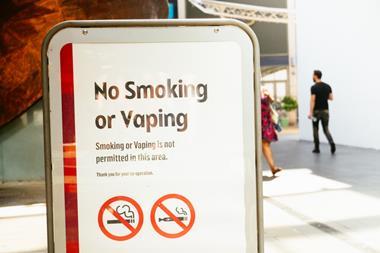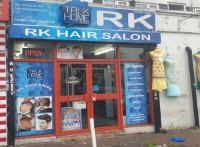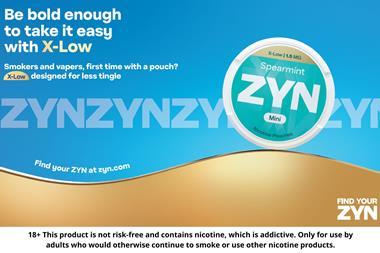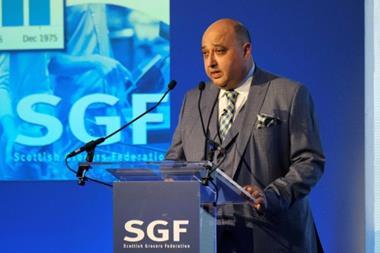The illicit tobacco trade harms legitimate retailers and the communities they serve. Gaelle Walker explores what needs to be done to be rid of it
As all good local retailers will testify, tobacco is one of the most vital categories in your stores. It’s a fact that in addition to visiting convenience stores more regularly than other shoppers (4.5 times per a week on average according to HIM), adult smokers also spend more while they are there, snapping up secondary purchases such as soft drinks and snacks alongside their smokes.
And we also don’t need to remind you that thanks to the UK’s astronomical tax burden (the average cost of a pack of 20 cigarettes in the UK is now more than triple that in some European countries such as Poland), tobacco is now an incredibly expensive commodity in the UK. Plus it’s one which can generate lucrative profits for the seller (although we know that most of you would prefer a slightly larger slice of those.)
Unfortunately, like any prized commodity be it diamonds, gold, or these days, copper tobacco’s high-value status has not been lost on the world’s criminal gangs, who are finding ever more cunning ways to beat the system and profit from the illicit sale of tobacco.
And profit they do. A case of 10,000 cigarettes bought for £400 in the Ukraine and smuggled into the UK, for example, can garner a profit of £800 a 200% return on the investment even when sold at half the cost of legitimate UK brands.
Stay safe at the cash and carry
Bob Fenton, TMA security liaison manager and former Met Police chief superintendent, advises retailers to follow these tips to keep safe at the cash and carry:
Don’t go to the cash and carry at the same time every week stagger your visits so that nobody can work out your routine
Park your vehicle as close to the cash and carry exit as possible
Carry any purchased tobacco as discreetly as possible. An unmarked cardboard box is a good idea
If possible try to take someone with you to act as a second set of eyes and ears
Always push the trolley in front of you so its contents are within your sight at all times
When leaving the cash and carry car park, remain alert to anyone possibly following you. If you think you are being followed but are unsure, try to confirm by making an unplanned turn or going twice around a roundabout
If you are being followed then drive straight to the nearest police station or a petrol station forecourt where there is lots of CCTV surveillance
If attacked avoid confrontation. Better that you give up your products rather than suffer serious assault, or worse
Try to remain as calm as possible and focus on remembering a detailed description of your attackers and if possible a vehicle registration. Write these down as soon as you can as information such as this is vital to the police.
Latest HMRC figures estimate that the illicit market diverts more than 11% of cigarette and a staggering 49% of hand-rolling tobacco sales away from legitimate retailers’ tills and into the coffers of criminals. It’s a huge sum for honest traders to miss out on.
Those feeling the pinch of the illegal trade may also be aware that the structure of the illicit tobacco trade is shifting. While counterfeit tobacco still accounts for the largest share of the illicit market, making up 45% of all large-scale cigarette seizures and 50% of hand-rolling, latest HMRC data suggests that these dirt cheap imitation products are slowly losing their grip.
Instead, growth is being driven by genuine but smuggled intra-EU brands, and increasingly ‘cheap whites’ from outside of the EU.
Priced at about £4 for 20, these genuine foreign but non-UK duty paid products, such as the Chinese brand Jin Ling, are sold on street corners and car boot sales for slightly more than counterfeit packs, which typically command £2.50 to £3 a pack.
They taste better than counterfeit and are significantly cheaper than UK duty-paid brands, making them almost irresistible to the hard-up UK smoking public, which remains largely ignorant of the black market’s true darkness.
In fact, according to a survey of 1,000 adult smokers by research company Holden Pearmain, a staggering 21% were considering purchasing tobacco from cheaper non-shop sources as a direct result of the current economic conditions.
And, of course, the illicit trade isn’t restricted purely to street corners and car boot sales. The lure of more lucrative margins is also proving too attractive for some less scrupulous retailers to resist much to the grievance of their more responsible counterparts.
“We have a big problem with the illicit trade in Hastings,” explains East Sussex independent retailer Dave Newman, of Westhill Stores. “There’s been a massive influx of small so-called ‘convenience stores’ opening in the past year and they sell illicit stock a mixture of cheap whites and counterfeit brands from under the counter at far cheaper prices than legitimate stock would command. They are very brazen about it, and they do it for the money and the higher margins.”
But it’s not just legitimate and responsible retailers who are missing out. Each year the treasury loses billions of pounds in unpaid taxes to the illicit trade. However, this vast sum is clearly still not enough to force the government to re-think its tax regime, which, following the January VAT increase to 20% led cigarette prices to rise by a further 66p, despite retail industry protests.
So what exactly can be done to erase the black market’s dark stain from the UK streets? Well, the government believes it has the answer in its refreshed Tackling Tobacco Smuggling strategy, which it published earlier this month. However, the general consensus among retailers and wholesalers is that its plans don’t go nearly far enough.
The crux of the strategy is extra resources for HMRC to fund more frontline staff and better technology to tackle organised criminals. It also promises tough new sanctions for traffickers and larger suppliers, such as custodial sentences of up to seven years and financial penalties of up to 100% of the value of tax evaded.
While tougher sanctions for the illicit trade’s bigger fish are welcome, the strategy doesn’t do enough to tackle the smaller fry, the dealers who darken street corners and peddle their counterfeit and smuggled wares at car boot sales and markets.
If the UK is to have even a hope of rubbing out the illicit tobacco trade, significant funds must also be allocated to tackle the problem at street level. And by that we mean more feet on the beat to disrupt the illicit trade at the point of sale, and tougher penalties for the street corner dealers.
As Association of Convenience Stores chief executive James Lowman puts it: “The strategy must go further, encompassing more of government than customs’ policy. The illicit tobacco trade thrives on the streets of our most deprived communities and it is at this level that customs strategy is weakest.”
What’s also needed in order for customs strategy to be effective is a dramatic improvement in partnership working between HMRC, the police, Trading Standards and the wider community, including retailers.
This will clearly present a challenge. A recent summit co-ordinated by the Tobacco Manufacturers Association (TMA) and think tank Progressive Vision, and attended by representatives from Trading Standards and the Police, concluded that current partnership working wasn’t what it could be, and as a result “intelligence gathering was substantially insufficient”.
That’s not good news considering that nearly all moves to disrupt the illicit trade are intelligence based.
A strengthening of ties between retailers, who are the eyes and ears on the streets, and Trading Standards officers will also be key although it will be challenging in some postcodes to say the least.
Trading Standards authorities would be wise to follow the example being set by Brandon Cook, Trading Standards manager for community services at Staffordshire County Council. Having realised the value of strong ties between his team and the retailing community, Cook decided to hold regular focus groups to help build trust on both sides.
“We know that we have to work hard to show retailers that we are here to help them, not catch them out. It’s a two-way street,” he says.
When it works, effective relationships between Trading Standards and retailers can bring results, as a recent seizure in the West Midlands demonstrates perfectly. Fed up with losing his precious sales to a local street dealer, the retailer whose identity has been kept secret contacted Cook’s team, which later launched a sting and caught the seller red-handed.
“This was a great result for the local retailers, Trading Standards and the community,” Cook says. “We need the intelligence from people who are close to the problem so that we can channel our resources more efficiently. I would urge anybody who has any information to contact the local Trading Standards’ service and pass it on in as much detail as possible. You can also be sure that it will be treated confidentially.”
Better communication of such successful outcomes would also be welcome helping to reassure retailers that their tip-offs are worthwhile, points out Imperial Tobacco UK communications manager Iain Watkins. “Retailers need to be aware that the information they supply is taken seriously and acted on.
“Once reported, HMRC looks into all the information it receives, and sometimes it can form part of a larger picture,” he says.
But, of course, it’s also important for authorities to keep in mind that any action they take to stem the flow of counterfeit and smuggled tobacco into the UK could mean the gangs will look elsewhere for their supplies, and target soft options such as c-store retailers’ stock.
Federation of Wholesale Distributors (FWD) chief executive James Bielby explains: “An unfortunate consequence of a successful tobacco smuggling strategy is that the criminal gangs who flood the streets with illegal products are unlikely to go away they will simply look closer to home for their supplies.”
And, according to the FWD, which collects data on criminal activity from its members, reports of thefts from customers in cash and carry car parks are already on the rise.
A growing number of retailers are also being hijacked on their journeys home from the cash and carry by criminals who employ shunting scams to trick them into pulling over, while others are being attacked once they arrive back at their stores.
Last year Birmingham retailer and NFRN president Parminder Singh was followed back to his store after a cash and carry visit and brutally attacked while unloading. “I now take every precaution possible when visiting the cash and carry, but it was a terrifying experience and I don’t think that I’ll ever fully get over it,” he says.
His fears are echoed by independent Spar retailer Steve Denham, who is still haunted by memories of a terrifying night-time raid on his West Sussex store’s tobacco gantry last year.
Stories such as these are chilling, and greater public awareness of them would help to shatter the misconception of the illicit trade as a ‘robin hood’ crime.
There is a pressing need for better consumer education of the illicit trade’s true darkness. Schemes such as The North of England Tackling Illicit Tobacco for Better Health programme are proving highly successful, and a nationwide approach could have a significant impact.
Only by reducing demand and attacking the illicit supply chain with a fully integrated enforcement strategy can the UK really start to rub out the damage being done by the black market.


























No comments yet